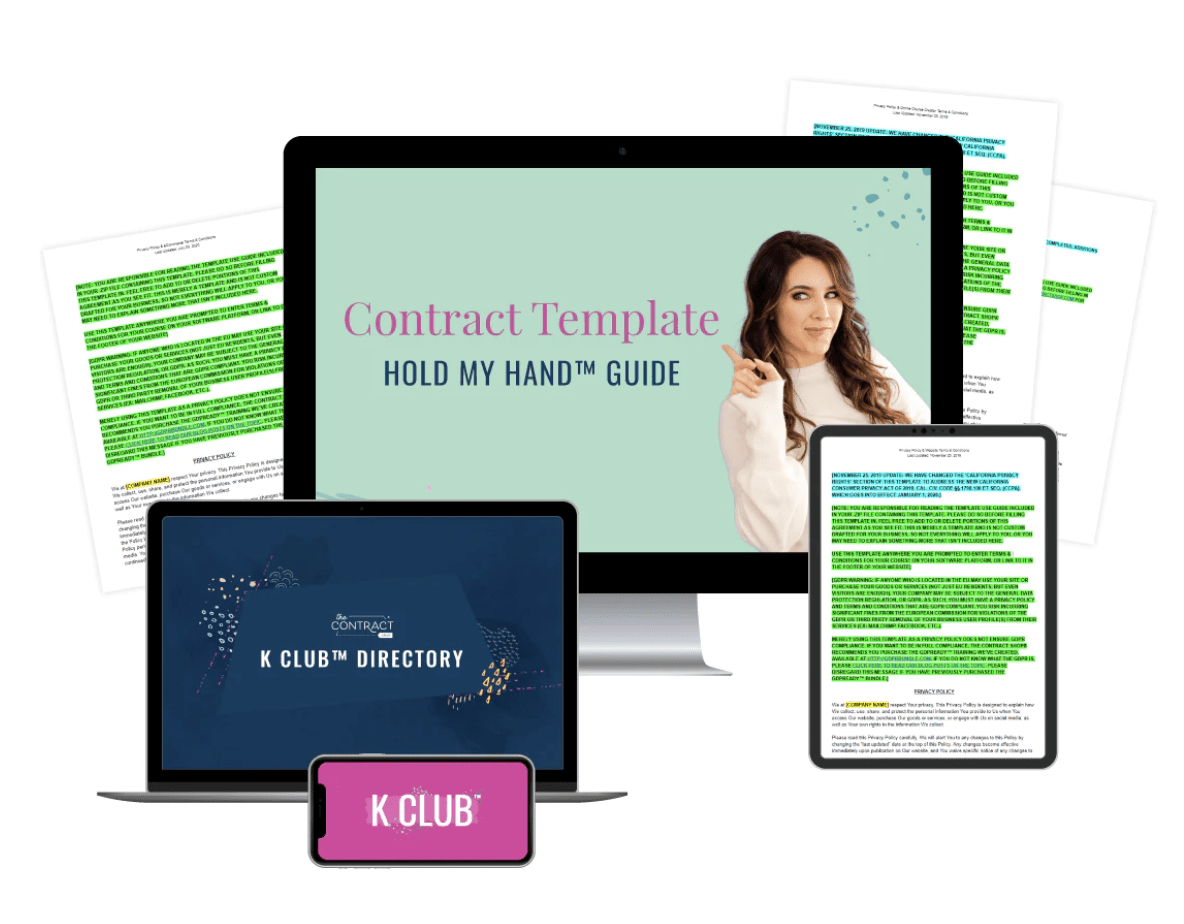Wondering what your small business website needs to be successful online? We've got your list of 10 must-haves your website needs to run smoothly, meet legal requirements and appeal to search engines. As well as what to include to delight website visitors who land on your site.
1. Easy-to-find contact information.
If you don’t have a contact number, email address or dedicated contact page how are potential customers supposed to get in touch with you? Believe it or not, there are actually businesses out there without visible contact details on their website!
Make sure to include several methods of contacting you, for users to discover, throughout your website. From a phone number in the top corner, email address in the footer menu, and address on the contact page. Even a standard contact form, are all good options.
Where possible or relevant including your physical address, with a link to your location in Google maps is great, too. Especially if you are a physical brick and mortar store.
The point is to make it very easy for website visitors to communicate with you through their preferred contact method.
To take this step even further, you could include an FAQ’s section. Where you show frequently asked questions on your contact page. This way website visitors have an understanding of what to expect when they reach out. Furthermore, you could provide commonly asked questions that answer what website visitors would usually want to contact you about.

2. Sitemap
Basically, a sitemap is a “map” of your website that helps search engines find, crawl and index all of your site’s content. Incorporating the sitemap, from a functionality point of view, in your websites’ user interface makes it easier for visitors. Especially when they need to find the content they are most interested in seeing from you. More importantly, a sitemap is of great benefit for search engines and improving your website crawlability. For instance, sitemaps help Google robots process and categorise the pages on your website. This is also known as indexing your pages. All of which are great for improving your SEO rankings.
3. SSL certificate
Also known as ‘Secure Socket Layer’. Which is a cryptographic protocol that helps encrypt communications over the Internet. As part of Google’s ongoing mission to build a more secure web, it’s now become imperative for businesses to seriously consider an SSL certificate for their websites. Not only would your secure website be favoured in search, but it’s also now favoured by the web visitors using Google Chrome. To find out if you have an SSL, a padlock next to your website URL will be present.
4. Terms & Conditions
A Terms and Conditions page is one of the most essential pages and an absolute must if you have an eCommerce website. Website Terms and Conditions can cover a lot of things and it’s up to you to decide what you need.
The most essential elements to include in your T&C’s are:
- Cookie Policy
- Terms and Conditions of Trade
- Distance/Selling Regulations (Terms and Conditions) for eCommerce
- Your Website Privacy Policy
5. Privacy Policy
A Privacy Policy is designed for websites that collect and process personal information.
The privacy policy for your website should ideally cover:
- details of personal information collected by the website,
- information about cookies used by the site,
- details of how personal information is used,
- details where personal information may be disclosed to third parties
- information about data security.

Find legal templates through The Contract Shop
Templates for privacy policies can easily be found on the internet and tailored to suit your needs. A great place to start is with The Contract Shop. They have a Terms & Conditions and Privacy Policy bundle for website owners.
6. Social Proof, Testimonials & Reviews
The proof is in the social proof! Testimonials and reviews are essential for building that initial trust between you and your potential clients. When a lead first lands on your website, you need to win over first impressions. Furthermore, you need to stand out with glowing customer feedback and reviews to legitimise your business even more.
Having testimonials on your website goes a long way. From bridging the gap between initial contact and, the journey to building a strong relationship with a client. Overall, honest words from genuine reviews can make your products/services look more tangible from an online viewpoint.
Social proof can be shown in many different forms. From including well-known logos (relevant to your customers/work opportunities) that build credibility. To testimonial snippet quotes, accompanied with a photo/logo of a real person.

You can even take reviews a step further with video testimonials like how NIZE does on our Student Success Stories page. Below is an example of video success stories from our industry partners at Verum – a digital marketing agency in Auckland.
Video success stories as a form of testimonials from Verum

Moreover, enabling third-party review platforms like Yelp, or Google Reviews to show on your website. That way, you aren’t the only source showing testimonials or controlling the type of feedback and reviews shown on your site. Because anyone can put a review about your business on Google and Yelp etc.
7. About Us Page
There is nothing more annoying than landing on a small business website and not being to find an about page. By nature, we are curious and, it’s a fair point. Most people want to have a clear idea about whos behind the business they’re intending to do work with. Just like testimonials legitimise your product/service claims, an about page puts a face to the brand. Which also legitimises the business existence. Because then people know there are real humans (and not robots) running the biz!
Having a picture of you and your team, on your about page, adds a personal touch to your site. Seeing a human face will make visitors relate to you better than a wall of impersonal product pictures and text. Furthermore, it’s also another great way to build trust through authentic and real images of the actual people behind the brand. A professional photographer will know how to produce great quality photos of your team, for your website. Good quality presentation speaks louder than words.
A great example of a cohesive and effective about page is by Firefly Digital. They have an extensive about us page that includes their story, mission, values, and a Meet the Firefly Team section. Which features two NZIE Digital Marketing graduates Sanjana and Tama.
8. Email opt-in capture forms
Nowadays, it’s hard enough work getting visitors to land on your small business website. And stick around long enough to consume your content. Therefore, it’s a great opportunity to deploy an email opt-in to capture an email address and first name to grow your email list. To successfully do so, you will need a worthwhile incentive to get users to give up their details to you. For example, a free download to a PDF resource. Or for instance, a free workshop like the one we are currently hosting on SEO and website visibility.
Treat email addresses like they are sacred. As the last thing anyone wants is poor quality, salesy and annoying emails flooding their inbox.
More importantly, when collecting email addresses make sure you adhere to the Data protection act and the latest GDPR laws.
9. Blog Section
Having a blog section, as a part of your small business website, has a multitude of advantages. Most important of which is that a blog will drive traffic to your site, and increase your SEO. Moreover, blog articles are a great way to showcase your expertise and create industry-relevant, thought leadership content.
On the other hand, a blog section is a great place to house ‘how to’ content. That could be relevant for the products or services you offer. Another idea, you could interview team members who are experts in their fields and create blogs from that.
Blogging is also an opportunity for you to use keyword-rich content to appear higher on Google results pages.
10. Copyright information
Having Copyright information is a useful way of clearly making your claim over the website. Showing the copyright to your website marked in the footer menu is an efficient way of deterring anyone who might wish to plagiarise your work. How do you do this? Simply add ‘Copyright’ with the correct year and remember to update it every year.
BONUS: SEO Strategy
Once you’ve got the essentials nailed the next thing you’ll need to look into is an SEO Strategy. After going live, it’s easy to sit back and think all the hard work of putting together a great small business website is done. But it’s only the beginning! If you want regular website traffic, new business opportunities, sales, inquiries, the whole lot. Then you need to seriously invest in a 12-month optimisation plan to really see your website take off! And, if you already have a sitemap, doing regular articles on your blog, you are already favourable in Google’s eyes. So why not keep the momentum going and make an appearance high up on the search engine results page!




